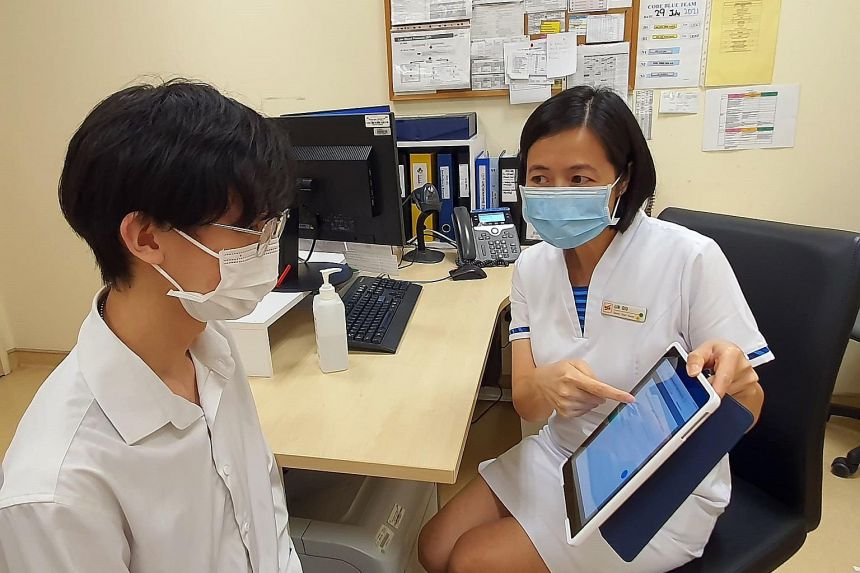
A polyclinic nurse using a smart triaging system on an iPad to assess a patient's risk of coronary heart disease. The system can save about 30 minutes of the patient's time in the clinic and ensure timely intervention at the National Heart Centre Singapore.PHOTO: SINGHEALTH POLYCLINICS
This and home care will sustain system as it deals with Covid-19 and ageing population
A virtual "doctor" analysing the heart readings and medical history of patients with chest pain has become a common sight at a couple of SingHealth polyclinics.
All that the attending nurse has to do is key in the details of the patient's condition and medical history, and the iPad "doctor" does the rest.
After assessing any risk of coronary heart disease, the computer algorithm in the tablet may recommend diagnostic tests and a follow-up with specialists at the National Heart Centre Singapore (NHCS).
The computer's help with immediately booking tests and appointments can save about 30 minutes of the patient's time in the clinic and ensure timely intervention at the heart centre.
But, of course, the polyclinic doctor, who will assess the patient, has the final say in accepting the computer's recommendations.
Similarly, before an appointment, patients at the Singapore General Hospital's Diabetes and Metabolism Centre can use a feature in SingHealth's Health Buddy app to fill in a questionnaire to update their doctors on their condition and concerns. This allows the doctors to tailor their patients' treatments, and the app feature - called MyVisit - will be expanded to NHCS outpatients next month.
The use of such technologies is one way to sustain the healthcare system as it deals with Covid-19 and the ageing population, said Second Minister for Health Masagos Zulkifli yesterday.
He was speaking at the opening of the 11th Singapore Healthcare Management Congress, which involved about 1,800 healthcare leaders in various countries to discuss best practices and innovations virtually.
Mr Masagos outlined various ways to keep the nation's healthcare system affordable, accessible and at its peak. They involve using technology and home care to optimise treatment, easing healthcare workers' workload, and taking care of their well-being.
He said: "Even as we continue our fight against Covid-19, we must not lose sight of our long-term focus to strengthen our healthcare system and ensure its sustainability."
He also cited a programme by the National University Health System (NUHS) in which patients with acute conditions, who would otherwise need to be hospitalised for intravenous treatment and monitoring, can be treated at home.
The patients are fitted with wearables that send real-time vital signs to the care team in the hospital. A multi-disciplinary medical team can then visit the patients.
The NUHS@Home programme, which started last October, is being piloted in a partnership with the Ministry of Health's Office for Healthcare Transformation.
Mr Masagos said more than 70 patients have been part of the pilot to date, including many who are elderly and feel more comfortable staying at home.
He added that the medical fees for these home patients were lower by 20 per cent, compared with those hospitalised.
"While further studies are warranted before such programmes can be scaled up, it is certainly a good start to see how technology can enable us to create alternatives to hospitalisation."
On the polyclinics' computer algorithm for patients with chest pain, Mr Masagos said the smart technology also helps to free up healthcare professionals' workload.
"Traditionally, the (booking of referral appointments and tests) is done very manually and in a time-consuming manner for both patients and patient service associates."
The smart system has been piloted in Bukit Merah and Outram polyclinics since August 2019, and has facilitated 2,900 appointments at NHCS.
The system has also helped to reduce more than 260 unnecessary specialist visits so that more appointment slots are available for urgent cases, SingHealth said in a statement.
The aim is to introduce the smart system to other polyclinics within a year, said Associate Professor Yeo Khung Keong, SingHealth's deputy group chief medical informatics officer of research.
SingHealth is also looking to develop more of such systems for those with eye and dental conditions.













 Get it on Google Play
Get it on Google Play